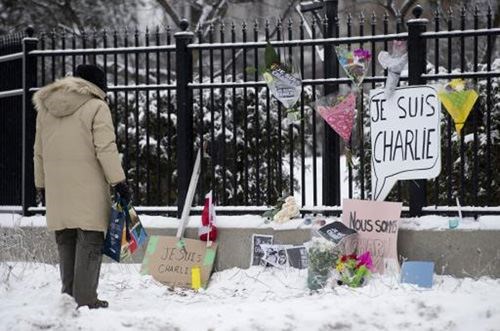PARIS - Scattered gunfire and explosions shook France on Thursday as its frightened yet defiant citizens held a day of mourning for 12 people slain at a Paris newspaper. French police hunted down the two heavily armed brothers suspected in the massacre to make sure they don't strike again.
French President Francois Hollande - joined by residents, tourists and Muslim leaders - called for tolerance after the country's worst terrorist attack in decades. At noon, the Paris metro came to a standstill and the crowd that gathered near Notre Dame cathedral fell silent to honour Wednesday's victims.
France has been struck directly in the heart of its capital, in a place where the spirit of liberty - and thus of resistance - breathed freely, Hollande said.
France's prime minister said the possibility of a new attack is our main concern and announced several overnight arrests. Tensions ran high in Paris, and police patrolled schools, places of worship and schools. Britain increased its security checks at ports and borders.
Satirical newspaper Charlie Hebdo had caricatured the Prophet Muhammad and witnesses said the attackers claimed allegiance to al-Qaida. One of the suspects on the run had a past conviction for recruiting jihadis to fight in the Mideast.
Two men resembling the suspects robbed a gas station in northeast France on Thursday morning and police swarmed the site while helicopters hovered above. Officials said later the newspaper attackers were not there.
Two explosions hit near mosques early Thursday, raising fears the deadly attack at Charlie Hebdo would ignite a backlash against France's large and diverse Muslim community. No one was injured in the attacks, one in Le Mans southwest of Paris and another near Lyon, southeast of the capital.
But France's top security official abandoned a top-level meeting after just 10 minutes to rush to a shooting on the city's southern edge that killed a policewoman. The shooter remained at large and it was not immediately clear if her death was linked to Wednesday's deadly attack.
French Prime Minister Manuel Valls said the two suspects still at large in the Charlie Hebdo slayings - Cherif Kouachi, 32, and Said Kouachi, 34 - were known to France's intelligence services. Cherif Kouachi was convicted of terrorism in 2008 for being involved in a network sending radical fighters to Iraq.
The two should be considered armed and dangerous, French police said in a bulletin, appealing for witnesses after a fruitless search in the city of Reims, in French Champagne country.
A third suspect, Mourad Hamyd, 18, surrendered at an eastern police station after learning his name was being linked to the attacks in the news, said the Paris prosecutor spokeswoman Agnes Thibault-Lecuivre. She did not specify his relationship to the Kouachi brothers.
A French security official said seven people had been arrested overnight, speaking on condition of anonymity because the investigation was ongoing. He did not elaborate on their possible links to terror.
Fears have run high in Europe that jihadis trained in warfare abroad would stage attacks at home. The French suspect in a deadly 2014 attack on a Jewish museum in Belgium had returned from fighting with extremists in Syria; and the man who rampaged in the south of France in 2012, killing three soldiers and four people at a Jewish school in Toulouse, received paramilitary training in Pakistan.
France raised its terror alert system to the maximum and bolstered security with more than 800 extra soldiers guarding media offices, places of worship, transport and other sensitive areas.
A mosque in the city of Le Mans, 200 kilometres (125 miles) southwest of Paris, was hit overnight with training grenades and gunfire, local prosecutor Philippe Varin told The Associated Press. No one was injured.
Another explosion hit a kebab shop Thursday next to the mosque of Villefranche-sur-Saone in southeast France. A regional spokeswoman said no one was injured but criminal intent was suspected. She would not comment on any possible link to the Charlie Hebdo attack.
One witness to Wednesday's attack at Charlie Hebdo said the gunmen were so methodical he at first mistook them for an elite anti-terrorism squad. Then they fired on a police officer.
The masked, black-clad men with assault rifles launched the attack around noon. The publication had long drawn condemnation and threats for its depictions of Islam, although it also satirized other religions and political figures.
The gunmen headed straight for the paper's editor, Stephane Charbonnier, killing him and his police bodyguard first. Shouting Allahu akbar! as they fired, the men then called out the names of other specific employees.
Eight journalists, two police officers, a maintenance worker and a visitor were killed and 11 people were wounded, four of them critically.
One police official, speaking on condition of anonymity because the investigation was ongoing, said the suspects were linked to a Yemeni terrorist network.
Both al-Qaida and the Islamic State group have repeatedly threatened to attack France, which is conducting airstrikes against extremists in Iraq and fighting Islamic militants in Africa. Charbonnier was specifically threatened in a 2013 edition of the al-Qaida magazine Inspire. A caricature of Islamic State's leader was the last tweet sent out by the newspaper, minutes before the attack. Its feed has since gone silent.
Cherif Kouachi, who was sentenced to 18 months in prison after being convicted of terrorism charges in 2008, has said he was outraged at the torture of Iraqi inmates at the U.S. prison at Abu Ghraib near Baghdad.
Associated Press writers Philippe Sotto, Elaine Ganley, Angela Charlton, Sylvie Corbet and John Leicester in Paris; Raphael Satter in London; Sarah el-Deeb in Cairo; Zeina Karam and Diaa Hadid in Beirut; and Aya Batrawy in Dubai, United Arab Emirates, contributed to this story.



